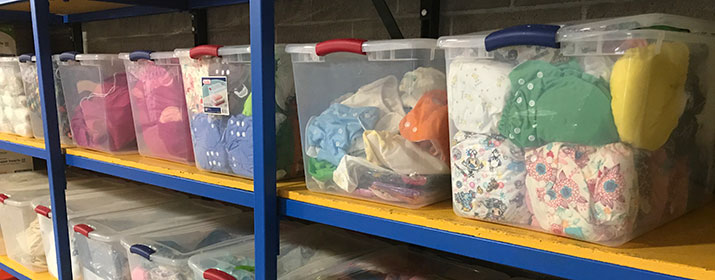
The Diaper Bank of Southern Arizona is using funds donated by Tucson Electric Power to respond to growing demand for cloth diapers during the coronavirus pandemic.
TEP donated $5,000 last year to the bank’s cloth diaper program, which promotes them as a less-expensive alternative to disposable diapers for low-income parents and caregivers. The contribution provides 50 starter kits, as well as additional program support.
The money has been especially helpful during this time because of an increase in requests for information and cloth diapers, said Leslie Pike, the bank’s program manager.
Some parents became concerned when stores were running out of disposable diapers, especially in early March when buyers were stocking up. Plus, with more time at home, parents are able to take the time and care needed to wash diapers for their babies and toddlers. Many daycare providers won’t use cloth diapers.
In addition, the bank started a webinar program to train caregivers and parents about how to use the cloth diapers – a prerequisite for receiving the free kits.
With the TEP money, employees are preparing kits more quickly. In the entirety of last year, the bank distributed 63 kits. As of early April, the bank was already on track to give out 50 kits and had plans to provide more.
“Without TEP’s funding at this moment, that wouldn’t be possible,” Pike said. “It caught us all by surprise how it’s playing out. But we’re ready for it.”
The bank recently obtained a donation of cloth diapers from Jake’s Diapers, a nonprofit organization in Wisconsin, so it can stretch the TEP dollars to assist more families.
At the bank’s warehouse, an area is designated as the “Renewable Diaper Resource Center, Powered by TEP.”
“Before TEP stepped in with this funding, our program was much smaller and had a more narrow reach,” Pike said. “Now we’ve been able to expand our program. It’s made all the difference in the world.”
Pike said her teammates understand that cloth diapers don’t work for every family, but they want to offer the alternative, in part because they cost less money in the long run.
“Few things are more stressful to a mom or dad than not being able to pay the monthly bills. Saving hundreds of dollars per year, per child, means being able to cover other expenses more easily,” the bank’s grant application stated. “Cloth diapers last for years, and when a child outgrows them, they can easily be used for another child.”
There are some environmental benefits as well because cloth diapers don’t end up in landfills. Athough they do require water for washing, researchers in a University of Arizona study found that caregivers reported only one additional laundry load a week.
“By providing cloth diapers, we’re accomplishing two goals: helping families with the basics they need while at the same time helping our environment by keeping disposable diapers out of landfills,” said Wendy Erica Werden, Manager of Community Investment and Philanthropy. “Really it’s a win-win situation for everyone.”
In addition to the cloth diaper program, TEP contributed $5,000 to the bank for a campaign to serve active-duty military families at the Davis-Monthan Air Force Base and other locations. The funding will provide 30,000 diapers – part of the bank’s goal of distributing 1 million diapers to help 25,000 military families.






